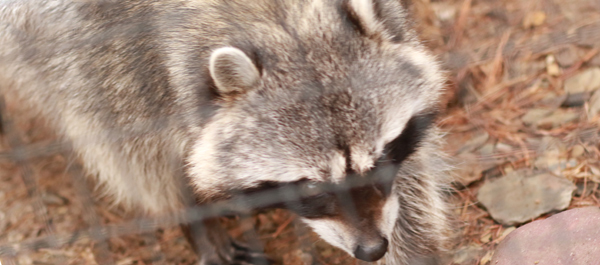- info@wildlife-removal.com
Call us for help in your town
Wildlife Removal Education
How Big Do Raccoons Get?
Need raccoon removal in your hometown? We service over 500 USA locations! Click here to hire us in your town and check prices - updated for year 2020.
Raccoons are a species that have been able to thrive in the United States, and from once being hunted across the country for their fur, they now live alongside people in many towns and cities, where they will often find plenty of food sources. Indeed, in many cases raccoons have actually become a nuisance in many urban areas, tearing apart garbage bags and stealing pet food in their quest to find food to eat. Because of the abundance of food sources that the raccoons can find around the urban areas, the number of larger than usual raccoons being discovered are actually increasing, while in captivity the way that the animals grow can also be different to the raccoons in the wild.

How Quickly Do Raccoons Grow?
When they are born the tiny raccoon cubs are only around four inches in length, and weigh between two and three ounces each, and at this stage they are also deaf and blind, and completely reliant on the mother. However, these little creatures grow quickly with the nourishment from their mother's milk, and having been born in the spring, they will usually grow through to adulthood and leave their family den as juveniles in the fall. They will continue to grow throughout their lives, although at a much slower rate, which is why most of the largest raccoons to be found are usually longer lived adults in areas where there are plenty of food sources.
read more About Raccoons.
Raccoons Reaching Adulthood
When the raccoons move onward into their adult lives, they will usually be at the lower end of the size and weight scale that is usual for the species, and one of the interesting aspects is that the winter coat and fat reserves will mean that raccoons are usually a little heavier into that time of year. The territorial range of the individual animals can also dictate the size of the animal too, and other factors will also come into play in dictating how large the animals grow. In general, raccoons will usually be between sixteen and twenty eight inches in length, and will weigh between eight and twenty pounds. Younger raccoons also have a relatively high mortality rate, so you will find that more of the older raccoons will be larger specimens.
Raccoons - Do they make a good pet?
The Largest Raccoons Discovered In The Wild
There are plenty of hunters that will claim they have caught giant raccoons over the years, and it is perfectly possible to have done so, but in terms of the largest raccoons that have been evidenced, it is a Wisconsin example that is the heavies that has been discovered. This huge animal for the species was over treble the usual weight for raccoons, at over sixty two pounds in total. This type of animal is very rare however, so it certainly shouldn't be something that you should be worried about encountering when you are putting out the garbage or walking through your local woodland.
Raccoons In Captivity
One of the factors to consider when you look at raccoons that are kept in captivity is that by raising them in this way, the animals are protected from many of the risk factors that cause juvenile and young raccoons to be killed in the wild. This means that raccoons in captivity will generally have much longer lives, with some living up to twenty years, and where their diet is not appropriately restricted you will see that many such raccoons are above average size. However, as these raccoons make up a small part of the population, you shouldn't expect to see raccoons in the wild of the same size and weight as those that are kept in captivity.
Go back to the Raccoon Removal page.


















